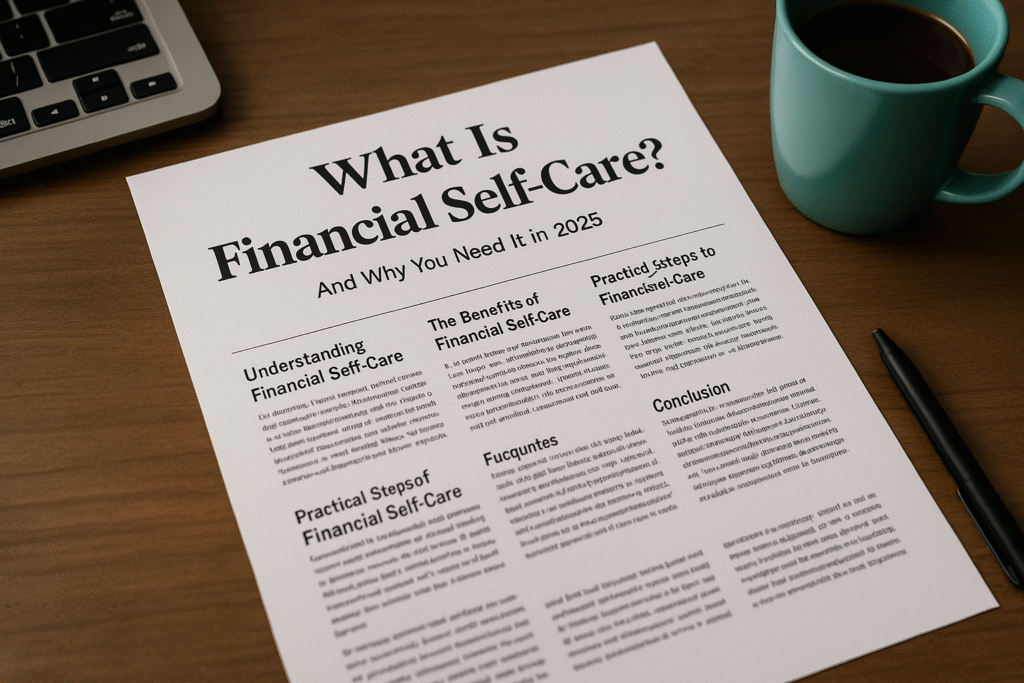Introduction
We’ve all heard of self-care—lighting candles, taking bubble baths, journaling to clear the mind. But there’s one kind of care we tend to avoid, even though it’s just as vital: financial self-care.
In 2025, with rising living costs, economic uncertainty, and increasing digital distractions, building a relationship with your money that is calm, thoughtful, and intentional isn’t just smart—it’s essential. Financial self-care isn’t about being perfect with your money. It’s about treating your financial life with the same care, kindness, and consistency that you give your physical and emotional well-being.
This guide will break down what financial self-care really means, why it matters now more than ever, and how to practice it—step by step.
1. What Is Financial Self-Care?
Financial self-care is the intentional practice of managing your money in a way that supports your well-being. It’s not just about spreadsheets or savings goals—it’s about reducing anxiety, building confidence, and aligning your financial actions with your values.
It includes:
- Regular check-ins with your finances
- Creating realistic budgets
- Saying “no” without guilt
- Setting goals that feel good—not just impressive
- Protecting your future with smart habits today
Financial self-care isn’t a one-time task—it’s an ongoing routine.
2. Why You Need It Now More Than Ever
Life in 2025 is fast, noisy, and financially complex. From student loans to digital subscriptions, from inflation to economic uncertainty, stress around money has never been higher.
Key reasons you need financial self-care today:
- Burnout: Financial stress contributes to mental and emotional fatigue.
- Information overload: Everyone’s giving advice, but little of it is personalized.
- Lifestyle creep: As income rises, so do expenses—often unconsciously.
- Digital spending habits: Contactless payments make it easy to lose track.
Just like you need to rest your body, you need routines that protect your financial health.
3. Emotional Benefits of Financial Self-Care
It’s not just about dollars—it’s about peace of mind.
Practicing financial self-care helps you:
- Reduce anxiety around bills, debt, and savings
- Feel more in control of your future
- Strengthen your confidence in making decisions
- Build better boundaries in relationships and purchases
Money doesn’t have to be a source of shame. It can be a tool for empowerment.
4. How to Build a Financial Self-Care Routine
Like physical self-care, your financial routine should be personal and sustainable.
Step 1: Set a Weekly Money Check-In
- Pick one day and time (ex: Sunday mornings)
- Review your budget and spending
- Pay bills or schedule payments
- Reflect: How did money make you feel this week?
Step 2: Create Safe Spaces for Financial Growth
- Read one money article per week
- Follow empowering financial voices on social media
- Journal about your financial wins and fears
Step 3: Set Boundaries That Protect Your Energy
- Unsubscribe from tempting email promos
- Mute accounts that make you feel inadequate
- Say “no” to outings or subscriptions that don’t bring value
Step 4: Build Safety Nets
- Automate savings (even $10/week)
- Create an emergency fund (aim for $500–$1,000 first)
- Review insurance and retirement plans annually
Small actions = big peace of mind over time.
5. Reframe Guilt Into Growth
Many people carry guilt about past financial decisions. But guilt doesn’t build wealth—growth does.
Try this reframe:
- “I should’ve saved more.” → “Now I know what to do differently.”
- “I’m so bad with money.” → “I’m learning how to care for my finances.”
Financial self-care is a practice, not a perfection test.
6. Financial Self-Care Isn’t One-Size-Fits-All
Forget the one-size-fits-all advice. Your routine should reflect your:
- Lifestyle: Are you a student? A parent? A digital nomad?
- Personality: Do you like structure or freedom?
- Goals: Are you saving for peace, retirement, or a house?
Give yourself permission to build a relationship with money that feels good and fits your life.
7. A Monthly Financial Self-Care Checklist
Use this checklist to stay consistent:
- Review income and expenses
- Update savings or debt totals
- Cancel one unused subscription
- Reflect on one financial win
- Set one intention for next month
Routine builds resilience.
Conclusion: Money Is a Form of Self-Love
Taking care of your money is taking care of yourself. Financial self-care doesn’t require perfection—it requires presence. By checking in, setting boundaries, and giving your money a little more attention, you create a life that feels calmer, clearer, and more aligned.
Start small. Start now. And remember: you don’t need to master money to begin—you just need to begin with compassion.
